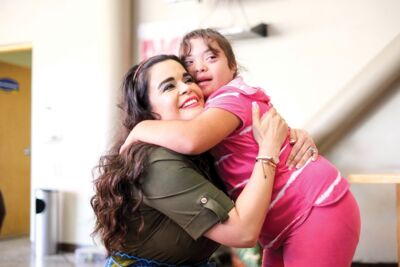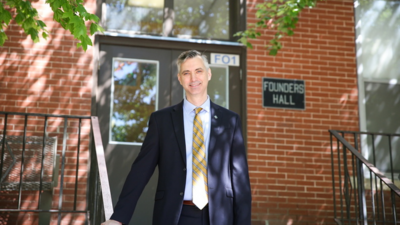Getting an Education to Become a Special Education Teacher

Today, our nation’s schools are facing a tremendous teacher shortage. Well trained high school, middle school, elementary school, and early childhood teachers are in high demand. The area of special education is short of qualified teachers more than any other subject area and earning an education degree offers a person a wonderful job outlook. To become a special ed teacher, you must complete a bachelor’s degree in education at an accredited institution. Earning the K-12 Special Education degree will certify you to be the lead teacher in a special education position.
Both private schools and public schools need special education teachers. So, a decision that you will have to make when earning an education degree is which type of school you want to work in. In some cases, if choosing a private school, there will be additional requirements. An example of this would be in the Lutheran Church-Missouri Synod school system, where a teacher must earn a Lutheran Teaching Diploma to be called to one if its schools. Other religious based schools may have their own unique requirements to fulfill before they will hire you.
Most university programs will require you to complete 120 or more credit hours. Most of these are completed in the college classroom. To become a special education teacher, you will take courses that prepare you to work with students who have disabilities. The Individuals with Disabilities Education Act (IDEA) is the law that provides for special education services to all children in the PK-12 school setting. It has 13 categories that children can be identified as in order to receive special education services. College students like yourself will learn about each of these 13 categories, which include physical disabilities, vision and hearing impairment, intellectual disabilities, autism, emotional disturbance, attention deficit hyperactivity disorder, developmental delay, multiple disabilities, speech language impairment, and learning disabilities to name a few. College students earning an education degree to become a special education teacher will also learn the details surrounding the use of and appropriate way to write individualized education programs, or IEP.
Special education teachers work with all general education teachers as well as teaching assistants, commonly called paraeducators. Your college courses will cover your role as a collaborator, as well as topics such as instructional technology, teaching math, teaching reading, American sign language, adaptive physical education, intervention strategies, child development, diverse classroom strategies, teaching exceptional learners, assessment, individualized education program, evaluation, special education methods, teaching students with moderate disabilities, teaching students with mild disabilities, classroom management, literacy instruction and intervention, and more.
Be a part of the next class of special educators.
Along with completing the required coursework, when earning an education degree, you will need to complete field experience hours, sometimes called practicum hours. Each state will vary on the number of hours required. In Nebraska, you must complete 100 hours of field experience prior to student teaching. The student teaching experience, also sometimes called practicum or the professional semester, is the culminating experience and requirement for a college student, like yourself, to complete in order to earn an education degree. This is a 16-week practice experience, where as a college student, you will be paired with a veteran teacher under whom you will practice becoming an independent teacher. If you want to teach both general education and special education you will complete additional student teaching hours, usually around eight weeks more.
You might wonder what else you could do with an education degree. While teaching is the most practical use of the degree, the skills you will gain as an education major, and specifically as a special education teacher can match up well with other potential jobs. Becoming a social worker or speech language pathologist are two examples. In order to move from teaching to one of these fields, you will need to earn a graduate degree to best prepare yourself for the new skills you will need to acquire and in order to hold any needed licensure or credentials. If you want to remain in the field of education, but desire to earn a master's degree, there are also many options. You can take your bachelor’s education degree and build on it by earning a master's degree in educational administration, reading specialist, trauma and resilience, educational specialist, or one of many areas specifically related to teaching special education students.
As a special education teacher, each day will bring new joys and challenges. You will find yourself working one on one with special needs students, teaching small groups, or in some instances co-teaching an entire class alongside a general education teacher. There are also other team members you will work with, called related service professionals. These include many specialists who are trained in unique areas such as occupational therapy, physical therapy, and speech language therapy. As a special education teacher, you also must work closely with parents of your special education students, staying in close communication with them. As you can see, a special education teacher needs to have excellent people skills.
Each student with an IEP will also have an IEP team. As a special education teacher, you are often going to be the case manager for your students’ IEP teams. This means you will organize the team, schedule meetings, collaborate with members of the team, and write the IEP. Team members include general and special education teachers, related service professionals, parents, an administrator, paraeducators, and the child if his parents desire. There is a lot to juggle as a case manager, and most special education teachers have about 20-30 students on their caseload. That is a lot of meetings to schedule and IEPs to write. But you are trained to do all of this and should feel equipped to do so after earning your education degree. The IEP team’s most important role is to monitor the student’s progress.
Some of the other roles you will play as a special education teacher involve assessing students’ ability levels, planning lessons, taking data, and making instructional decisions. The students you will serve have a variety of learning disabilities and sometimes physical disabilities, so you will need to understand the common characteristics within each type of disability and feel confident in your ability to adequately serve and teach such students. Earning an education degree and becoming a special education teacher will equip you to do all of this and more.
Related Stories


